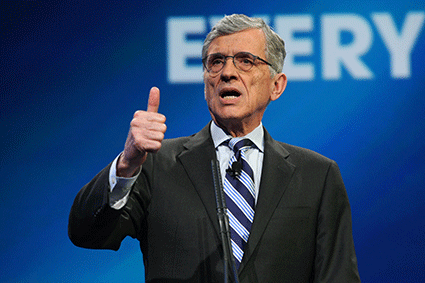Ovation Decries ‘Palace Intrigue’ of FCC Set-Top Process
The smarter way to stay on top of the multichannel video marketplace. Sign up below.
You are now subscribed
Your newsletter sign-up was successful

WASHINGTON — Ovation TV and Vme TV, both independent programmers, want Federal Communications Commission chairman Tom Wheeler to put out the agency’s set-top box proposal for comment in a further notice of proposed rulemaking so they can see just what the FCC is proposing and allow for a few weeks of comment.
Wheeler has lifted the sunshine prohibitions on contacting FCC officials about the proposal, but not the changes to the item now being hashed out by commissioners. The chairman pulled the set-top plan from the agenda of last month’s public meeting, giving commissioners more time for vetting. However, he has declined to publish the text (it is considered work product until finalized) or to put the latest proposal for out public comment.
Without seeing the details of the new proposal, Victor Cerda, senior vice president of Hispanic-targeted Vme TV, told reporters on a Monday conference call that dealing with Wheeler’s set-top plan has been like “negotiating with a mime.”
Cerda and executives from Ovation, an arts-focused channel, took part in the conference call organized by the Future of TV Coalition (both programmers are members) to talk about their ongoing problems with Wheeler’s plan to “unlock” the cable set-top box. Chief among them is that they aren’t sure what’s in it.
They are sure, however, that if the plan gives the FCC any role in reviewing their contracts with distributors it will be a big problem.
Wheeler moved from an original set-top based approach to making MVPD content available to third-party navigation devices as a way to promote set-top competition. After major blowback from virtually all quarters — including top congressional Democrats — he pivoted to a more app-based approach.
When that approach also drew flak — and it became clear that Wheeler didn’t even have the votes of all the FCC Democrats — the item was pulled from the FCC’s Sept. 29 public meeting agenda. It was put in circulation for a vote, but in an unusual move, the FCC preserved the sunshine-rule prohbitions on contacting FCC decision-makers about the item.
The smarter way to stay on top of the multichannel video marketplace. Sign up below.
After complaints from Vme and many others, the sunshine-rule prohibition was lifted. But FCC staffers were still limited as to what they could say, prompting Cerda’s comment about talking to a mime.
"We actually sit there and present it and hope from their body language and their questions we can glean some idea of what is being worked into the rule," he said.
Cerda said he had worked on homeland-decurity issues and in government and had not seen this level of secrecy in other contexts where he thought it was more defensible. "Here, dealing with a cable box and television, and this kind of approach … it's just bizarre."
NCTA – The Internet & Television Association had pushed an app-based proposal — Vme TV helped with that effort, Cerda said — but the chairman's variation and its subsequent tweaking was not what Internet-service providers, Vme or Ovation, had in mind due to the FCC's role in contracts.
But their baseline pitch was mostly about transparency. Whatever the FCC is proposing, the networks want to see it and figure out how it affects them. It’s hard to manage through uncertainty, and even harder for independents than large programmers, Ovation general counsel Robert Rader said.
Both Vme’s Cerda and Ovation executive vice president of distribution John Malkin said that the FCC chairman's "trust me" approach to the item did not cut it.
Part of Wheeler's goal with the set-top proposal, he has said, is to making it easier for viewers to find independent programmers in a unified search of online and traditional content.
Malkins said Ovation knows well the challenge of getting noticed as an independent, a fight the network fights every day. He also said that Ovation is fine with an app-based approach, but the FCC proposal appears to be a threat to the network’s business model.
Malkin said he was "surprised and alarmed at the decision not to share the information about a proposal that has changed markedly, and one that could impact the industry as a whole.
Among the "huge" issues Malkin said they remained in the dark about included: 1) whether the FCC was looking to create a compulsory license — Wheeler says no, but MVPDs and studios have said it sure looks like it; 2) how would contractual protections from networks being dropped or repositioned be conveyed to the new regime, if they would carry over at all; 3) what happens to their advertising; and 4) what does the search model look like and will sites with pirated content be searchable alongside Ovation's acquired or original, licensed content.
Rader said that if contractual protections were not secure, those hard-won elements would go for naught, and that he was concerned by the FCC's "rush and secrecy." Getting in a plug for Ovation’s new series, Versailles, about palace intrigue in the court of Louis XIV, Malkin said he saw parallels with how the FCC was handling the set-top item.
Wheeler has said there has been plenty of time to comment on the various issues in play.
Contributing editor John Eggerton has been an editor and/or writer on media regulation, legislation and policy for over four decades, including covering the FCC, FTC, Congress, the major media trade associations, and the federal courts. In addition to Multichannel News and Broadcasting + Cable, his work has appeared in Radio World, TV Technology, TV Fax, This Week in Consumer Electronics, Variety and the Encyclopedia Britannica.

